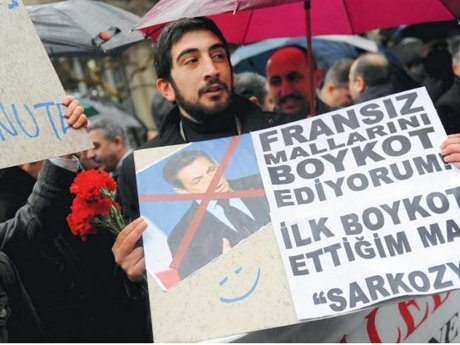George Jonas, National Post · Dec. 28, 2011 | Last Updated: Dec. 28, 2011 3:09 AM ET

With the European Union in crisis mode, Iran conducting naval exercises in the Persian Gulf and a morose youth toying with the Hermit Kingdom’s nuclear button in the Far East, you’d think France has enough on its plate without picking a fight with Turkey over history. That’s what you’d think – but you’d be wrong.
Last Thursday, France’s National Assembly voted for a law that would imprison and fine anyone who denied that the atrocities against Armenians committed by the Ottoman authorities in Turkey 100 years ago amounted to genocide.
By Friday all hell broke loose. Turkey’s ambassador left Paris. Political visits between the two countries are suspended. The two NATO allies aren’t talking to each other, but they have plenty to say to the press.
“We have been accused of genocide! How could we not overreact?” demanded Turkish ambassador Tahsin Burcuoglu before boarding his plane. He wasn’t trying to be funny. Turkish Prime Minister Recep Tayyip Erdogan went directly to the heart of the matter, demonstrating that “genocide” was a game at which two could play:
“France massacred an estimated 15% of the Algerian population starting from 1945. This is genocide,” he said.
French President Nicolas Sarkozy couldn’t muster much more in reply from Prague, where he was attending former Czech leader Vaclav Havel’s funeral, than a sentence whose second half was true: “France does not lecture anyone but France doesn’t want to be lectured.”
Only Armenian Foreign Minister Edward Nalbandian seemed happy. “Once again,” he said, “[France] proved its commitment to universal human values.”
Hmm. Maybe France did so 10 years ago, in 2001, when it took the official position that Turkish atrocities against Armenians in 1915 amounted to genocide, but last week, when French deputies initiated a process to jail everyone who disagreed, France only proved its commitment to universal human myopia.
Viewing the atrocities committed against Turkey’s Armenian minority in 1915 as genocide was defensible historically – and even if it hadn’t been, France would have been entitled to view them as it pleased. Nations, like individuals, aren’t obliged to pass tests of accuracy to hold historical views. In this case, though, France could in all likelihood have passed a test of accuracy for a bonus.
Last Thursday the French National Assembly went a giant step further. The deputies proposed a law that, if the Senate approves it, will make France’s official view everyone’s obligatory view.
Criminalizing contrary opinion doesn’t illustrate France’s commitment to universal human values. If it illustrates anything historically French, it’s the guillotine and the Reign of Terror. But what it really illustrates is President Sarkozy’s willingness to trade his country’s tradition of liberty for a perceived electoral advantage. There are an estimated half-million French voters of Armenian descent.
What France did in 2001 was compatible with a free society. Whether or not countries need to have “official” designations for historical events, many do. America recollects Pearl Harbor as “A Day of Infamy,” which it was. Some recollections are undisputed; others aren’t. In any event, to murder and dislocate an estimated one million human beings, as the Ottoman authorities did, may be fairly described as genocide, even if it irks the Turks – and even if some Armenians did, in fact, side with the Russian invaders as the First World War began, as Turkish apologists assert they did.
Being entitled and even justified to view Turkish atrocities against Armenians in 1915 as genocidal, however, doesn’t add up to a licence to de-legitimize other views. There can be no crime called genocide-denial in a free society because when such a crime appears in the law books the society is no longer free.
Saying this upsets some people. Does it apply, they ask, even to Holocaust deniers, or to members of the Flat Earth Society? I’m afraid so. Well, cannot free societies outlaw demonstrable error? Not if they want to remain free. Is freedom worth it, in this case? Yes, sure. We don’t outlaw the Flat Earth Society, yet we keep launching space vehicles. Very few people think the Earth is flat.
Like the President of France, I believe the atrocities committed against the Armenians in Turkey nearly 100 years ago amounted to genocide. Unlike the President of France, I don’t think it’s necessary to jail people who say otherwise. For one thing, I don’t think it should be a punishable offence; for another, cooperation within NATO seems to me far more important. Those who are too preoccupied with the last atrocity, risk walking headlong into the next one.
I suspect France’s foreign minister, Alain Juppe, would agree with me about this particular point more than he does with his boss. Juppe told the press that the vote on the genocide law had been “badly timed.” It sounded like a gigantic understatement.
via When free countries ban opinion, they’re not free.

Leave a Reply